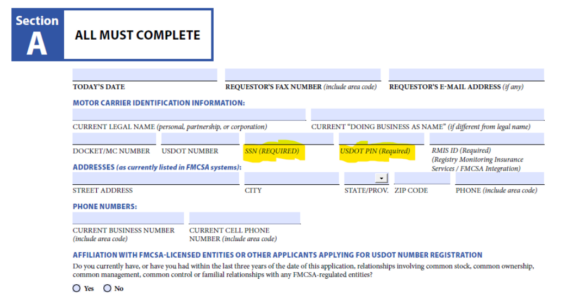This put up is a part of a collection sponsored by IAT Insurance coverage Group.
The Federal Motor Service Security Administration (FMCSA) has issued a warning a few refined phishing rip-off concentrating on motor carriers. Fraudulent emails, posing as official communications from the FMCSA are being despatched to registered entities with the intent of extracting delicate data.
These emails are designed to seem reliable, full with the FMCSA brand and formatting that intently mimics real correspondence. Nevertheless, the content material and knowledge requested are clear crimson flags for these within the know.
Instance of phishing e mail
Rip-off particulars
The phishing emails in query ask carriers to finish an connected registration kind. This way goes past the standard requests, asking for private particulars such because the service’s social safety quantity, USDOT private identification quantity and RMIS ID. In some instances, carriers are even requested to add copies of their certificates of insurance coverage and driver’s license, beneath the ironic pretense of “fraud safety.”

Don’t full this manner!
Recognizing the crimson flags
The FMCSA has emphasised they might by no means request such delicate data through e mail types. Official communications from the FMCSA regarding data requests will both direct you to log in to your portal account or will come straight from an FMCSA-dedicated mailbox. Furthermore, any reliable e mail from the FMCSA will come from an official FMCSA e mail deal with and never from the doubtful addresses at the moment getting used for these fraudulent requests: security@fmcsa.gov or submitting@fmcsa.gov.
Additionally, use the official FMCSA web site for biennial updates. Transportation firms should replace their data each two years, primarily based on the final digit of their DOT quantity. Should you make any adjustments to your fleet dimension, whether or not it grows or shrinks, replace your MCS-150 on the FMCSA web site. Solely obtain and fill out types from the official .gov web site. Failure to take action will influence your CSA scores and make you non-compliant.
It’s essential to stay vigilant and confirm any suspicious e mail seemingly from the FMCSA or different company. Should you obtain an e mail demanding private particulars or threatening to cancel your USDOT quantity inside 24 hours in the event you don’t comply, it’s a rip-off. The FMCSA and different U.S. businesses don’t function on this method.
5 tricks to defend your self from phishing scams
Listed below are 5 greatest practices to guard your self and your enterprise from falling sufferer to a phishing rip-off:
- Confirm the e-mail supply. At all times verify the sender’s true e mail deal with by hovering your cursor over it to disclose the total deal with. This observe will enable you determine the e-mail supply and decide if it’s reliable.
- Keep away from clicking on suspicious hyperlinks or downloading attachments. Likewise, if an e mail accommodates hyperlinks, hover over them to see the place they lead earlier than clicking. If the URL appears suspicious, do NOT click on it.
- Watch out for urgency. Phishing emails usually create a way of urgency to immediate rapid motion. Be cautious of any e mail that threatens drastic motion if you don’t reply inside a brief timeframe.
- Don’t share private data by e mail. By no means present private or delicate data through unsecured e mail communications. Keep in mind, official businesses just like the FMCSA won’t ever request account numbers, passwords, Social Safety numbers, USDOT PIN, bank card particulars, copies of invoices or different private data through e mail types or an unsolicited textual content, telephone name or fax. Should you obtain such a request, it’s a rip-off.
- Report suspicious emails. Should you obtain a suspicious e mail, instantly report it to the FMCSA or your IT division. This helps stop others from falling sufferer to the identical rip-off.
Why now? New login necessities from the FMCSA web site create confusion
In response to a presidential mandate for multi-factor authentication, the FMCSA started transitioning to Login.gov in 2024 to boost on-line security and safety. This transition requires all customers with credentials for any FMCSA system to make use of a Login.gov account to entry FMCSA methods as an alternative of utilizing their DOT PIN.
As of January 1, www.login.gov is the only technique for accessing the FMCSA portal and the Unified Registration System; nonetheless, throughout this era of transition, the phishing rip-off is benefiting from carriers who is likely to be confused by the brand new system.
To log in, you should now use the federal portal through Login.gov. The FMCSA PIN is now not legitimate for accessing the system. Make sure that to request a brand new login from Login.gov, choose who will likely be liable for the login, and make sure you full the verification course of by hitting the “GO” button or the “SMS” button, relying on the system you might be accessing.
ASK A LOSS CONTROL REPRESENTATIVE
Have a query on tips on how to mitigate threat? E mail losscontroldirect@iatinsurance.com for an opportunity to see your query answered in a future weblog.
By Nancy Ross-Anderson
Matters
Trucking
Focused on Trucking?
Get automated alerts for this matter.
